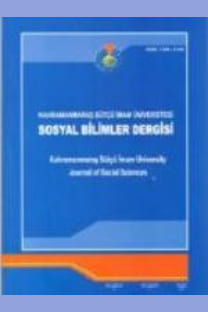Covid 19 Pandemi Sürecinde Online Satışlarda Algılanan Adaletin Tüketici Sinizmi Üzerine Etkisi
Covid-19, Hizmet Adaleti, Fiyat Adaleti, Tüketici Sinizmi
Impact of Perceived Justice on Consumer Cynicism
Covid-19, Service Justice, Price Justice, Consumer Cynicism,
___
- Acaray, Ali (2019). “Örgütsel Adalet Ve Örgütsel Sinizm Arasındaki İlişkide Güç Mesafesinin Düzenleyici Etkisi”, Uluslararası İktisadi ve İdari İncelemeler Dergisi, 24, 197-214.
- Akgüç Çetinkaya, Özlem. ve Ceng, Emine. (2018). “Türkiye’deki Black Friday Etkinliğinin Tüketici Sinizmi Bağlamında Bir Değerlendirmesi”, MANAS Sosyal Araştırmalar Dergisi, 7(4), 167-180.
- Andersson, Lynne M. (1996). “Employee Cynicism: An Examination Using A Contract Violation Framework”, Human Relations, 49(11), 1395-1418.
- Atılgan, Kalender Özcan, İnce, Talip ve Yılmaz, Sinan (2017). “Tüketicilerin Satın Alma Niyetleri Ve Boykota Yönelik Tutumlarının Tüketici Sinizmi, Fiyat Şeffaflığı Ve Fiyat Adaleti Bağlamında İncelenmesi”, Ç.Ü. Sosyal Bilimler Enstitüsü Dergisi, 26(3), 34-44.
- Balaji, M. S., Jha, Subhash, Sengupta, Aditi Sarkar ve Krishnan, Balaji. C. (2018). “Are Cynical Customers Satisfied Differently? Role Of Negative Inferred Motive And Customer Participation in Service Recovery”, Journal of Business Research, 86, 109-118.
- Baron, Reuben M. ve Kenny, Daivid A. (1986). “The Moderator-Mediator Variable Distinction İn Social Psychological Research: Conceptual, Strategic, And Statistical Considerations”, Journal of Personality and Social Psychology, 51, 1173-1182.
- Blodgett, Jeffrey G., Hill, Donna J. ve Tax, Stephen S. (1997). “The Effects Of Distributive Procedural, And Interactional Justice On Postcomplaint Behavior”, Journal of Retailing, 73(2), 185-210.
- Chambers, Brad A. (2002). “Applicant Reactions And Their Consequences: Review, Advice, And Recommendations For Future Research”, International Journal of Management Reviews, 4(4), 317-333.
- Chylinski, Matthew ve Chu, Anna (2010). “Consumer Cynicism: Antecedents And Consequences”, European Journal of Marketing, 44(6), 796-837.
- Cook, Walter W. ve Medley, Donald M. (1954). “Proposed Hostility And Parasaic Virtue Scales For The MMPI”, Journal of Applied Psychology, 38, 414-418.
- Çam, Mehmet Safa (2019). “Öyküleyici Reklamlar Ve Tüketici Sinizmi İlişkisi Üzerine Deneysel Bir Çalışma”, (Doktora Tezi), Selçuk Üniversitesi Sosyal Bilimler Enstitüsü, Konya.
- Çilesiz, Emre ve Selçuk, Gökalp N. (2018). “Hizmet Adaleti, Fiyat Adaleti Ve Güven Algılarının Müşteri Memnuniyeti Üzerindeki Etkisi: Kış Koridorunda Konaklayan Yabancı Turistler Üzerine Bir Araştırma”, Güncel Turizm Araştırmaları Dergisi, 2(1), 42-78.
- Davidov, Moshe (2003). “Have You Heard The Word? The Effect Of Word Of Mouth On Perceived Justice, Satisfaction And Repurchase Intentions Following Complaint Handling”, Journal of Consumer Satisfaction, Dissatisfaction and Complaining Behavior, 16, 67-80.
- Dean Jr. James W., Brandes, Pamela ve Dharvadkar, Ravi (1998). “Organizational Cynicism”, Academy of Management Review, 23(2), 341-352.
- Efeoğlu, İ. Efe ve İplik, Esengül (2011). “Algılanan Örgütsel Adaletin Örgütsel Sinizm Üzerindeki Etkilerini Belirlemeye Yönelik İlaç Sektöründe Bir Uygulama”, Ç.Ü. Sosyal Bilimler Enstitüsü Dergisi, 20(3), 343-360.
- Fang, Yu-Hui, Chiu, Chao-Min. ve Wang, Eric T. G. (2011). “Understanding Customers’ Satisfaction And Repurchase Intentions: An Integration of IS Success Model, Trust, And Justice”, Internet Research, Vol. 21(4), 479-503.
- Forehand, Mark R. ve Grier, Sonya (2003). “When is Honesty The Best Policy? The Effect Of Stated Company Intent On Consumer Skepticism”, Journal of Consumer Psychology, 13(3), 349-356.
- Göktaş, Bora (2019). “Tüketici Sinizmi Kavramı Ve Ağızdan Ağıza Pazarlama Eylemlerinin Sinik Tüketici Davranışlarına Etkisi Konusunda Bir Uygulama”, Uluslararası Toplum Araştırmaları Dergisi, 13(19), 1650-1692.
- Grewal, Dhruv, Hardesty, Daivid M. ve Iyer, Gopalkrishnan R. (2004). “The Effects Of Buyer Identification And Purchase Timing On Consumers’ Perceptions Of Trust, Price Fairness, And Repurchase Intentions”, Journal of Interactive Marketing, 18(4), 87-100.
- Güven, Esra (2016). “Tüketimde Sinik Tutum: Tüketici Sinizminin Sebep Ve Sonuçları”, İşletme Araştırmaları Dergisi, 2, 152-174.
- Hayes, Andrew F. (2013). “Introduction To Mediation, Moderation, And Conditional Process Analysis: A Regression-Based Approach”, New York: Guilford Press.
- Helm, Amanda E. (2004). “Cynics And Skeptics: Consumer Dispositional Trust”, Advances in Consumer Research, 31, 345-351.
- Helm, Amanda E. (2006). “Cynical Consumers: Dangerous Enemies, Loyal Friends”, (Doctoral Dissertation), Faculty of the Graduate School University of Missouri, Columbia.
- Helm, Amanda E., Moulard, Julie Guidry ve Richins, Marsha (2015). “Consumer Cynicism: Developing A Scale To Measure Underlying Attitudes Influencing Marketplace Shaping And Withdrawal Behaviours”, International Jour-nal Of Consumer Studies, 39, 515–524.
- Kanbur, Engin ve Canbek, Mustafa (2018). “Algılanan Örgütsel Adaletin Örgütsel Sinizm Üzerine Etkisi: Algılanan Örgütsel Desteğin Aracılık Rolü”, Business & Management Studies: An International Journal, 6(3), 36-57.
- Keyes, Dick (2006). “Seeing Through Cynicism: A Reconsideration Of The Power Of Suspicion”, City, IL: Inter Varsity Press.
- Martin, William C., Ponder, Nicole ve Lueg, Jason E. (2009). “Price Fairness Perceptions And Customer Loyalty in A Retail Context”, Journal of Business Research, 62(6), 588-593.
- Mohr, Lois A., Eroğlu, Doğan ve Ellen, Pam Scholder (1998). “The Development And Testing Of A Measure Of Skepticism Toward Environmental Claims in Marketers’ Communications”, The Journal of Consumer Affairs, 32(1), 30-55.
- O'Connell, Brian J., Holzman, Herbert ve Armandi, Barry R. (1986). “Police Cynicism And The Modes Of Adaptation”, Journal of Police Science and Administration, 14, 307-313.
- Preacher, Kristopher J. ve Hayes, Andrew F. (2008). “Asymptotic And Resampling Strategies For Assessing And Comparing Indirect Effects in Multiple Mediator Models”, Behavior Research Methods, 40(3), 879-891.
- Wanous, John P., Reichers, Arnon E., ve Austin, James T. (1994). “Organizational Cynicism: An Initial Study”, Academy of Management Proceedings, 1, 269-273.
- ISSN: 1304-8120
- Yayın Aralığı: 3
- Başlangıç: 2004
- Yayıncı: Kahramanmaraş Sütçü İmam Universitesi
Kültürel İktidar Ve Sinema: Vizontele Filmi Serisinde Kültürel İktidar Fragmanları
İlhami AYDIN, Zeynep Elif TUNÇ
Aksaray İli Hamidiye Alaca Ağzının Şekil Özellikleri Üzerine
Ercüment YILDIRIM, Ozan Arslan AYTAN
Farklı Değişkenlerin Öğrencilerin Düşünme Süreçlerine Yansımaları
Yok Olmaya Yüz Tutmuş Geleneksel Mimari: İzmir-Kiraz-Yağlar Evleri
Eski Uygurca Padak ve Türk Halk Edebiyatındaki Ayak Terimi Üzerine
Millî Mücadele’nin Çukurova Havalisinde Kadın ve Çocuklar
İŞİTME ENGELLİ ÖĞRENCİLERİN DİJİTAL OKURYAZARLIK BECERİSİNE İLİŞKİN ALGILARI
